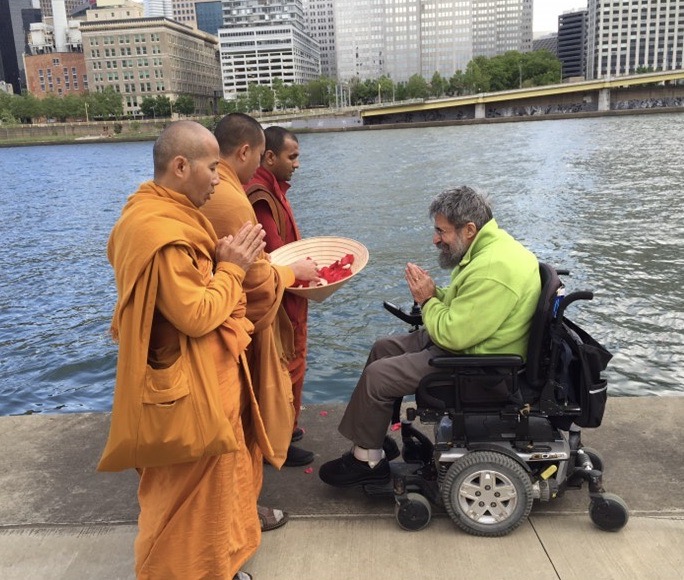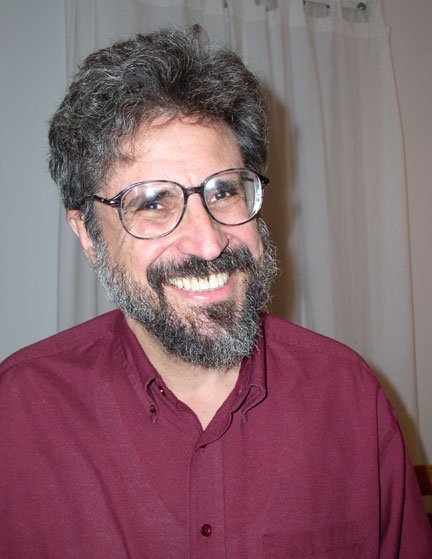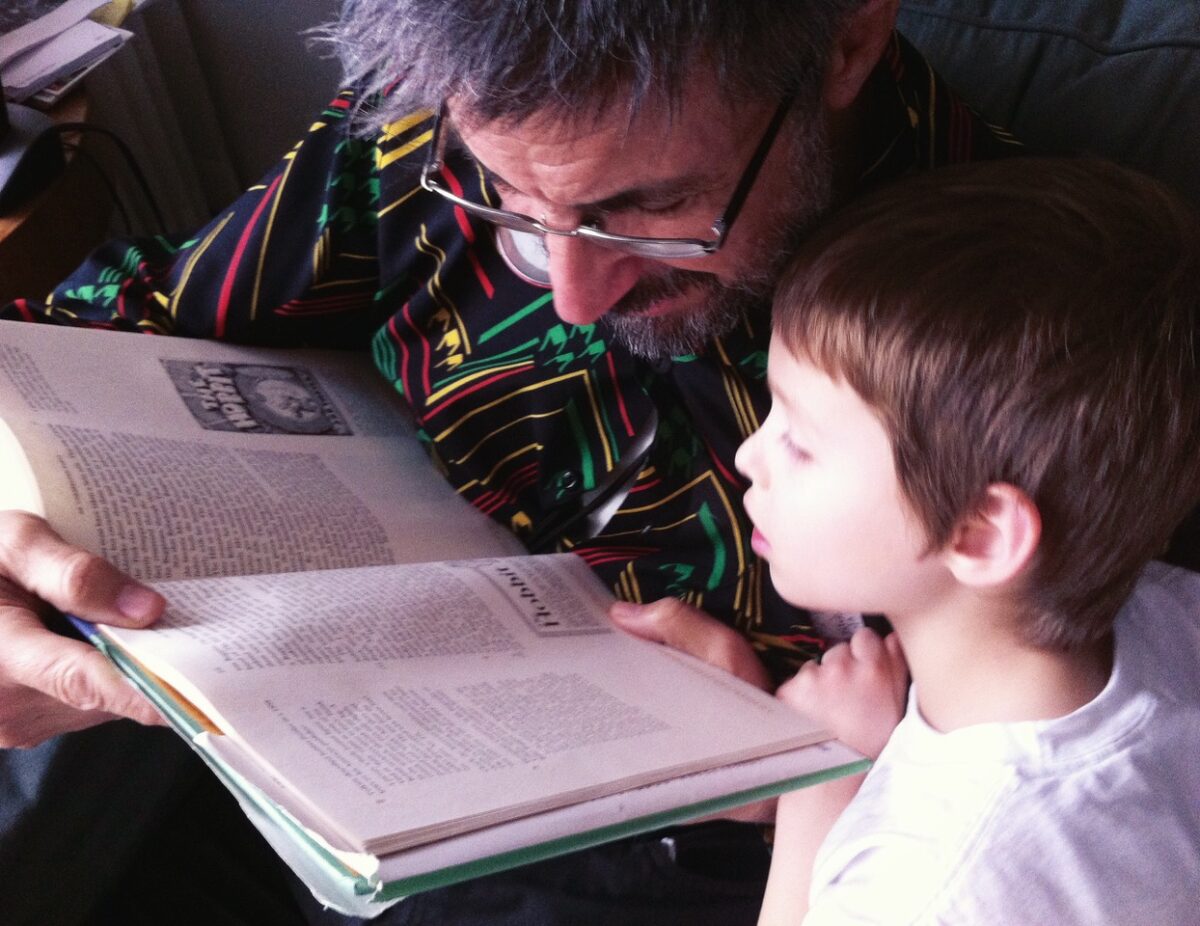Jonathan Robison “wouldn’t cross a picket line, even after his death.”
So his daughter, Joy Deborah Robison, wrote to the Pittsburgh Union Progress after her father died on Friday afternoon. She shared with this publication of the striking Pittsburgh news workers his obituary that she wrote with the help of members of the Pittsburgh community he served — as she put it at the top — as “activist, attorney, poet, troublemaker.”
Robison, who was 80, died peacefully at Canterbury Place, a part of UPMC Senior Communities in Lawrenceville, where he had lived since a debilitating fall in June 2021. Before that he’d lived in Squirrel Hill’s Riverview Towers after his wife, Mary Rita Schlichte Robison, died in 2015. Prior to that, the couple lived for all their 45 years of marriage — they wed in 1970 — within two blocks of the city’s North Oakland neighborhood.
His daughter wrote, “If you lived in Pittsburgh or any neighboring region for any length of time, you were touched by the work that Jon did. He, along with Mary and many others, fought for human rights, voting rights, fair zoning, public transit for all, equal representation and so much more. He fought for neighborhood preservation, for tenants’ rights, and for disability services and access. He kept peace vigils and hosted Freedom Seders. He fought for years to prevent expressways dumping thousands upon thousands of suburban cars into the middle of his beloved Oakland neighborhood. Though he got in the way of the powers-that-be many times, he was only arrested twice (though not for lack of trying). His speeches, and his long moments of silence, were expected and respected at City Council meetings.”
In fact, Robison ran for Pittsburgh City Council several times and for decades served as Democratic committeeman and in various positions in the Fourth Ward Democratic Party. His wife was his campaign manager and strategist. For decades the pair published a twice-yearly election newsletter “to inform and engage voters,” his daughter wrote. “This newsletter, along with their holiday cards, was mailed out to a list as deep as several thousand people at its peak, and was much anticipated by the recipients.”
This is how he lived his life. As he told told interviewer Anna Samuels for an oral history initiative in 2014, “I have a hard time imagining not being an activist. It’s … the strong personal belief that we can change the world, bit by bit. … It’s just me.”
As one of his legions of friends commented on a Facebook post about his passing: “Legend.”
Jonathan Benjamin Robison was born on Feb. 13, 1943, the first of two children of Gerson and Virginia Laguna Robison in New York City, and raised in upstate New York and Connecticut. He earned his bachelor’s degree in math from Wesleyan University in 1964.
This was in the middle of the Vietnam War. He was a peace activist and a conscientious objector to serving in the armed forces, but he joined the Army National Guard. He served for more than six years, his daughter wrote, “thankful that he was never called to active duty.”
He moved to Pittsburgh in 1968 and earned a master’s degree in urban and regional planning from the University of Pittsburgh in 1976. He was head of planning for Community Action Pittsburgh, an anti-poverty program. “Frustrated to have his efforts stymied by the particular use of zoning and other laws on the books,” his daughter wrote, he earned his Pitt law degree in 1982. “This set of degrees allowed him to carry on the five-generation familial tradition of activism and to continue the fight for civil rights and social justice” in the areas of zoning, elections, real estate, environment and municipal governance.
At his law office, he took on clients knowing they couldn’t afford to pay and was an early adopter of mediation and the concept of reparative justice, according to his daughter, who noted that the 1988 diagnosis that he had multiple sclerosis “only slowed him down to approximately the top speed of his power wheelchair.”

Family friend Ziggy Edwards, active with Pittsburghers for Public Transit, says, “When I joined PPT I got a real kick out of seeing him at the meetings.” She recalls him participating in the group’s first march against the Mon-Oakland Connector shuttle road project in 2018. “The Panther Hollow parklet doesn’t have ADA-compliant curbs, so he couldn’t be on the grass with us, which just highlighted some of the issues at hand. I’ll miss his legal mind and sense of humor.”
After closing his law office in the mid- to late 1990s, he kept working, including at Just Harvest toward food security. He was one of the founders of the Gertrude Stein Political Club and past president of the Allegheny County Transit Council. He was a member of Bet Tikvah synagogue and the Laughing Rivers Buddhist Sangha.
He always loved music and arts events, ranging from Calliope House to the Pittsburgh Symphony Orchestra, from Pittsburgh Savoyards to Pittsburgh Ballet Theatre.
In recent years, the “semi-retired” Robison focused on writing poetry, including a lot of haiku. He published a selection of his work online. Writing was a passion of his from early adulthood working as a newspaper reporter in Connecticut.
District 8 City Councilor Erika Strassburger remembers him, going to back to when she was chief of staff for his Councilor Dan Gilman in 2014, speaking his mind at Oakland community meetings, at which he’d work in reading a poem if he could, and he usually could. “He was a force to be reckoned with,” Strassburger says.
Interesting story that his friend and fellow transportation activist Stuart Strickland posted on Facebook, with photographic proof: “[L]et’s not forget [Robison] was childhood friends with Peter Tork of The Monkees. They lived next door to one another for years and shared a birthday (Pete was a year older). Pete invited Jon and a guest (me) to join him backstage of Stage AE when The Monkees 2011 tour took them to Pittsburgh. We got to talk for better than a half-hour together.”
Reflecting on her father on Monday, Joy Deborah Robison said, “All of these often disparate communities had a piece of him, and all had his heart. … He really made space for as many people as he could.”
She wrote in her obituary, “To list every organization he gave his time and energy towards would be a list as tall as the many stacks of books and newspapers in Jon and Mary’s home,” and she noted that paperwork from their progressive work is still being archived at the Senator John Heinz History Center. “[A]nywhere there was a just cause to defend, he was somewhere in the midst of it, wearing buttons and carrying signs, sometimes shouting, often singing (out of tune, but with delight and gusto).”
She requested, “Please honor his memory by continuing his work and supporting others who do. Hold your elected (and unelected) leaders accountable. Don’t give up and don’t lose track of your own personal political power. Give as generously as you can, with what you have to offer, to what you believe in, and what will make a difference of any measure.”
She invited people who knew him to contact her at his email address of radrobi13@gmail.com and make donations to the Abraham Lincoln Brigade Archives, the Labor Heritage Foundation “or a musical or activist organization that matters to you.”
In addition to his Joy and her family, who live in Rochester, Minn., Robison is survived by his sister, Jude Robison, who with her husband, Alexander DeVaron, came from their home in Philadelphia to attend his burial on Monday afternoon at Homewood Cemetery, beside his wife. Relatives and friends sang “I Dreamed I Saw Joe Hill Last Night.”
There will be a Zoom remembrance and celebration later this summer.

Correction: This story originally misidentified Ziggy Edwards.
Bob, a feature writer and editor at the Pittsburgh Post-Gazette, is currently on strike and serving as interim editor of the Pittsburgh Union Progress. Contact him at bbatz@unionprogress.com.


